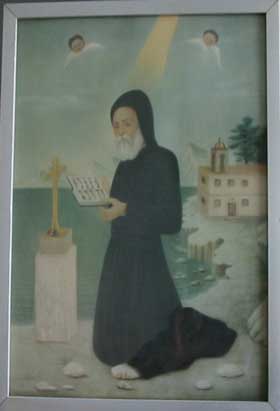

 |
Mar Awtel Tradition | 
|
| home | Forum, Keeping the spirit Alive | contact | guestbook |
| geography | etymology | speech | photos | history | saint awtel | y. moubarac |
|
The church of Saint Awtel is the only church anywhere to be dedicated to this saint. How old is the Saint Awtel tradition in Kfarsghab ? In a sure manner, we can say that the current church is dedicated to Saint Awtel since the end of the Eighteenth Century. It seems according to Aïn Tourini, that the Patriarch Douaihi quotes the church of Saint Awtel in his writings. Therefore, the Saint Awtel tradition could be prior to the Seventeenth Century, the Patriarch Douaihi having died in 1704. When we examine the list of the monks of Qozhaya originally from Kfarsghab, the list of the first emigrants, the list of firstnames of male members of the Immaculate Conception as well as the civil registers of the beginning of the Twentieth Century, we do not find the first name "Awtel" among the inhabitants of Kfarsghab. It is especially from the years 1940 and on that this first name Awtel shows with a higher frequency in the names of new-borns at the village. The Late Awtel Zeidan (born at the beginning of the Twentieth Century) is in our opinion the only one of his generation to bear the first name "Awtel". In the years 1940, this first name shows more often: Awtel Basha, Awtel Antonios Karam, Awtel Toufic Maroun, Awtel Haddad ... But it is especially from the 1950's, that the first name Awtel becomes à.la.mode where we practically find it in all the families (with however a higher frequency in the families living in the vicinity of the church). In the Middle-East, the first names are transmitted from grandfather to grandson. Accordingly, we find the same first names in a family throughout the centuries. First names, more than the patronymic names, are a guarantee of continuity. Thus, in the Laban family, we find three basic first names: Youssef, Boutros and Elias that will be repeated all along the generations. The disappearance of one of these first names in the family marks generally a rupture, either sociological, or geographical. Very often also, the first name of the grandfather replaces the patronymic name. Let us take as example the substitution that took place in the family of Abou Youssef Elias: the most important branch of the family took the first name of the son of Abou-Youssef Elias, Estephan. The other branches kept either Elias, or took the first name of their own direct ancestor as a patronymic name. It is astonishing in this cultural context that the name of the only saint of the village was adopted as a first name only very tardily, and this in spite of its old tradition in Kfarsghab. It could be that the Middle Eastern tradition of naming the boys according to the transmitted first names of the family had the upper hand during more than two centuries. This sociological fact deserves a more thorough research to understand the reasons of this late adoption of the first name "Awtel" in the tradition of Kfarsghab. Another important first name equally absent in the 19th Century is Maroun, the patron Saint of the Maronites. We can observe this tendency in Bcharri in the 19th Century where Maroun is very rare (less than 0.5%) and Saba (the Saint Patron of Bcharri) is under-represented. (1) |  |